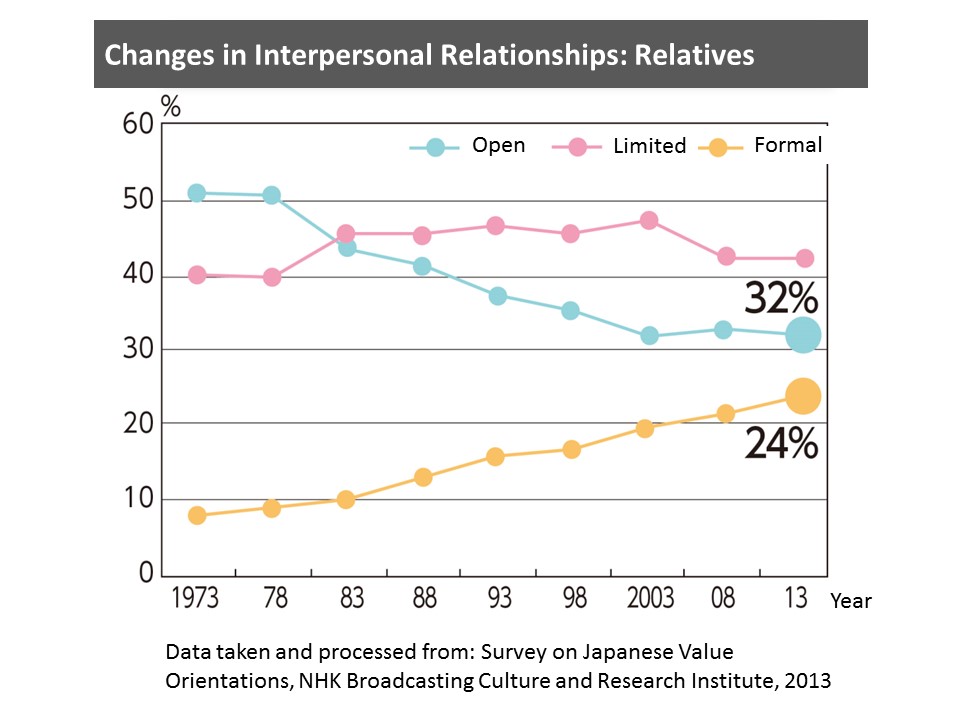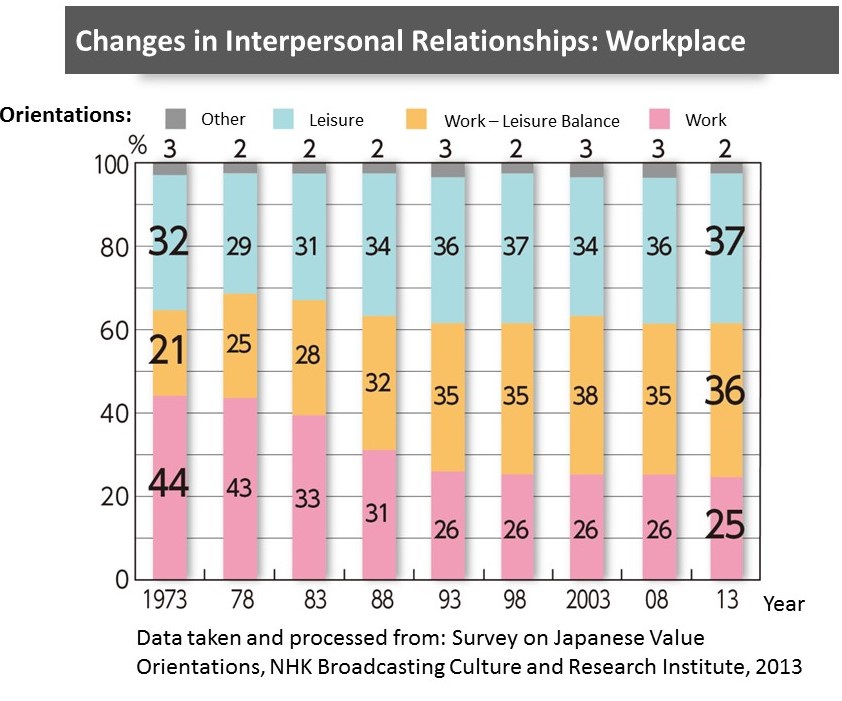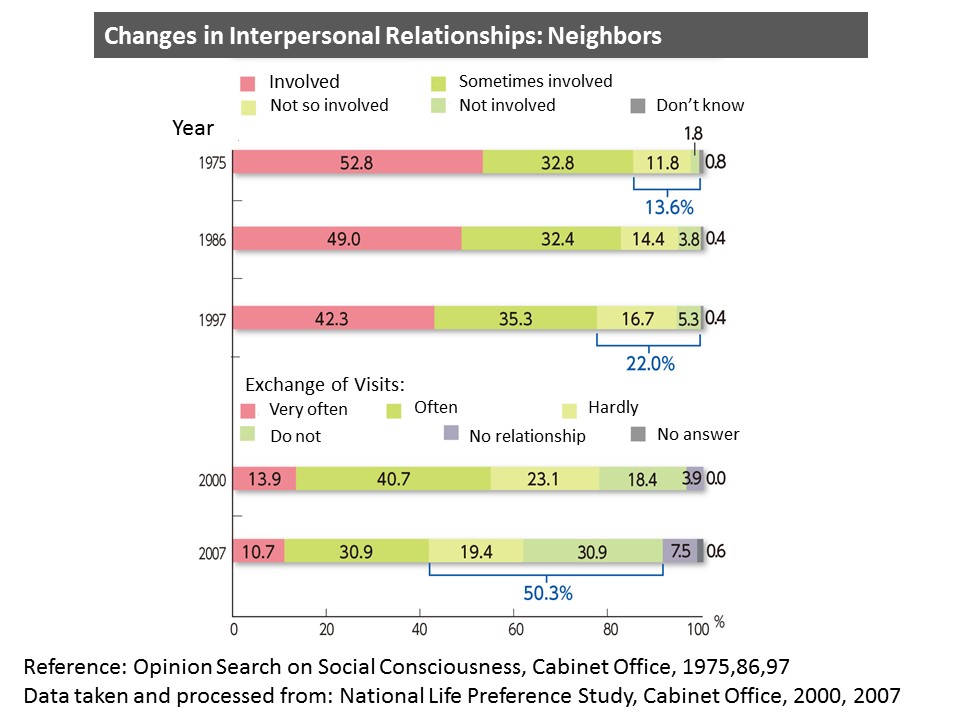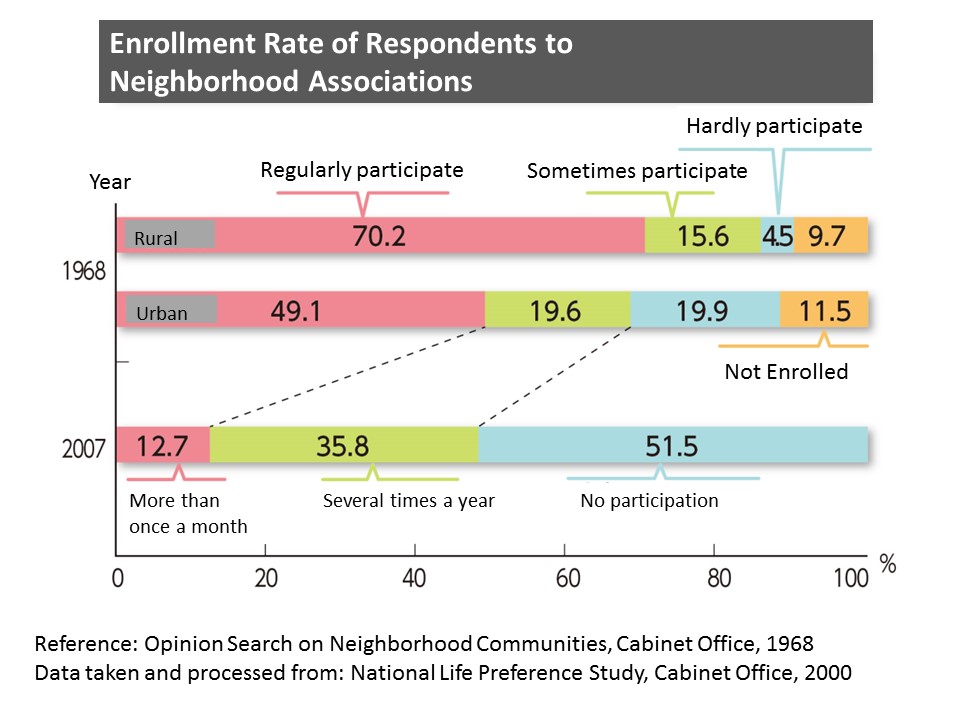”Social Ties” and ”Community” Weakening in Japan: CR Factory Community White Paper 2016 (2) Reports
Posted on March 01, 2017
The data book, CR Factory Community White Paper 2016 was created by a Japanese nonprofit CR Factory based on thorough research utilizing more than 20 books’ worth of knowledge on the topic, focusing on “tsunagari” (social connectivity) and community which might be linked to various raising social issues in Japan.
*For more information about CR Factory, please refer to the end of the article.

Change in Interpersonal Relationships: Relatives

As seen in the graph on the above, the Survey on Japanese Value Orientations, conducted by the NHK Broadcasting Culture and Research Institute in 2013, shows an increasing trend toward a preference for “formal” interpersonal relationships[1] with relatives. In 1973, the percentage of respondents with such a preference was only 8%, but in 2013, the percentage had increased to 24%. If the percentage of respondents with a preference for “limited” interpersonal relationships[2] is taken into account, the total percentage reaches almost 70% of the total number of respondents. Conversely, the percentage of respondents who preferred “open” interpersonal relationships has shown a continuous decline. In 1973, the percentage was above 50%, but in 2013, it had declined to 32%. As seen from the graph, changes in preferences regarding interpersonal relationships with relatives are apparent: people’s preference are moving from “open” or “closed” to either “limited” or “formal.”
Changes in Interpersonal Relationships: Workplace

Similar trends can be observed in the workplace. The Survey on Japanese Value Orientations, conducted by the NHK Broadcasting Culture and Research Institute in 2013, has revealed clear declining trends in people’s orientation towards work. For example, the percentage of people who were “work-oriented” was 44% in 1973, but in 2013, the percentage had dropped to 25%. On the other hand, the percentage of both “leisure-oriented” and “work-leisure-balance-oriented” people increased to more than 70% of total respondents. With regard to the observed changes in people’s orientation towards work, Mr. Mitsunori Ishida, an associate professor at Waseda University and author of the book Sociology of Isolation, explained that, in 1990s, the characteristics of Japanese companies, such as lifetime employment, the seniority system, and company unions, saw a rapid fall. Now, employees are trying to adjust to the company-led changes in work environment by changing their attitudes toward work. Therefore, as seen in the graph, people are showing more interest in enriching their leisure time rather than entirely devoting themselves to work,[3] and as a result of this extreme swing away from the workaholic lifestyle which had been a social norm in Japanese business, social identification with companies might be weakening.
Changes in Interpersonal Relationship: Neighbors

Looking at the figures compiled through the Public Opinion Survey on Social Awareness conducted by the Cabinet Office, a shift in people’s preferences for interpersonal relationships with neighbors can be observed. For example, in 1975, 52.8% of the respondents answered that they were “involved” when asked about their involvement with their neighbors; however, in 1997, the number had decreased to 42.3%. Meanwhile, the percentage of respondents that answered either “not involved” or “not so involved” increased from 13.6% in 1975 to 22% in 1997. Similar trends can be seen through the National Life Preference Study also conducted by the Cabinet Office. In 2007, the percentage of respondents who said that they “very often exchange visits” (which is similar to the previous answer of being “involved”) was 10.7%. This study also showed that, in 2007, the percentage of respondents who said that they “do not exchange visits” or “rarely exchange visits” had reached 50.3%. These figures offer concrete evidence of the dilution of interpersonal relationship among neighbors.

Furthermore, if we compare recent data to the Opinion Search on Neighborhood Communities conducted in 1968 by the Cabinet Office and look at the rate of respondents’ enrollment in neighborhood associations, which have played a central role in establishing local communities, the percentage is still above 70%, and there is no trend of decline. However, despite the high enrollment rate, actual participation in neighborhood associations has seen a drastic decline: in 1968, 70.2% of the respondents in rural areas and 49.1% of the respondents in urban areas stated that they “participate regularly in community activities,” whereas in 2007, the number had dropped to 12.7%[4]. As seen above, lower participation in neighborhood communities is an observable reality.
Potentials for New Solidarity
Japanese people have a relatively high interest in volunteer activities. People’s preferences for interpersonal relationships are changing with the passages of time, attachment to neighborhoods is declining, and yet the high rate of participation in volunteer activities and NPO activities commands attention. Through these new organizations, we may find the potential for new solidarity.
[1] The definition of “formal” interpersonal relationships is “Relationships confined to observing the formalities of family custom.”
[2] The definition of “limited” interpersonal relationships is “Relationships in which people contact one another casually.”
[3] This workaholic style had been (and perhaps still is) the mainstream, especially in the period of high economic growth following WW II.
[4] This latter number (12.7%) is derived from the National Life Preference Study conducted by the Cabinet Office. In the study, 12.7% of the respondents replied that they “participate at least once a month,” and these respondents were the most active.
About CR Factory
CR Factory (http://www.crfactory.com/) aims to foster close-knit communities in which individuals can form both emotional and physical attachments, thereby contributing to the creation of a society where everyone’s lives will be enriched by companionship and a sense of belonging.
Through the provision of workshops, seminars and consultations, CR Factory commits itself to practice hand-in-hand support to client NPOs, enabling clients, through experience, to learn the basics of organizational management and strengthen human resource development.
The interview article with Tetsuaki Go, the CR Factory’s representative, is available here.
Recent Articles
- Shared solutions, stronger communities: Social economy and social innovation in Europe and Japan
- NPO support for disaster victims: Key discussion points
- Beyond support: Fostering genuine dialogues
- Reconsidering the significance of public comments
- Towards a society where children want to embrace life
- The Evolution of Philanthropy: Five approaches shaping contemporary practice